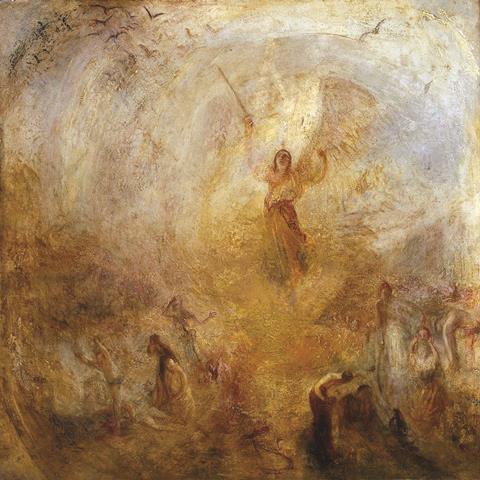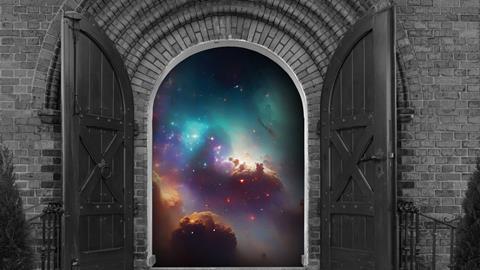It’s time to stop apologising for mystical experiences and brushing miracles under the carpet in the name of ‘seeker sensitivity’, says Pete Greig. It’s the supernatural claims of Christianity that make it stand apart – and people are hungry for it
The year is 1988. Rick Astley’s ‘Never gonna give you up’ is topping the charts, and I’m 18 years old, on the other side of the world, trying to smuggle Bibles into China.
I deposited my contraband in a hotel locker in the city of Guangzhou, where a brave brother in Christ would later risk imprisonment to collect them. By the time I got back to the border, it was shut for the night and a tropical typhoon was coming in strong off the South China Sea. With a heavy sigh, I lay down on the concrete floor, deafened by the din of the rain on the tin roof, and steeled myself for a very long night.
By 2am, the floods were rising – and I was getting worried. “Help me, Lord,” I whispered. “I don’t know what to do.” At that precise moment, a man appeared out of nowhere and beckoned me to follow him. Without a word, he led me down flooded lanes, through twisted alleys to a tiny glowing kitchen where a wok was sizzling. Stepping inside, I turned to thank him, but he had disappeared into the night.
And that’s how I found myself in a back street of a border town, soaked to the skin and wondering whether I might just have met an angel.
Perhaps you’re thinking: Wasn’t it just a nice man helping a bedraggled foreigner find shelter in a storm? Possibly. But as Christians we have learned to view the natural world through a supernatural lens. We scan the ordinary details of our everyday lives for extraordinary hints of God at work. Feelings of peace while applying for a job? Guidance! A chance to share faith after missing a train? Divine appointment! A parking space outside Tesco on a rainy Saturday? Miraculous provision!
So yes, I think I met a Chinese angel. And no, I don’t think I’m any more gullible than my neighbour. It’s just that, like most people who ever lived – and in the words of the soul band Hot Chocolate, “I believe in miracles” (before they continue, less helpfully, “since you came along, you sexy thing”).
The weird, the wild and the wonderful
There was a breathtaking moment at last year’s Leadership Conference in the Royal Albert Hall when Nicky Gumbel interviewed the historian Tom Holland (not yet a Christian, he says), and asked what he would like to get off his chest in front of 5,000 church leaders.
Without hesitation, Holland replied: “Oh, you need to talk more about the weird stuff!” by which I think he meant mystical experiences, speaking in tongues, gold dust at Bethel, healings at Lourdes, exorcisms, the Third Heaven, talking donkeys, words of knowledge, angels at the Chinese border, that kind of stuff.
“The thing is,” he enthused (and I paraphrase), “the Church has been way too successful!” (at which point, everyone looked a bit surprised). “I mean, you kind of invented care for the poor, but now we have the Welfare State; your monasteries pioneered healthcare and education, but now we have the NHS and state schools; your Bible uniquely teaches human dignity – the ultimate value of every individual – but now we have the European Convention on Human Rights. The State has basically stolen all your best ideas. The only thing you have left – because they can’t really take this from you – is the weird stuff. It’s the supernatural claims of Christianity that unsettle cynics like me. It’s your weird stuff that makes us sit up and wonder whether you might actually be more than just a sort of metaphysical alternative to the Liberal Democrats.”
Well, Holland – challenge accepted. No more apologising for mystical experiences. No more brushing miracles under the carpet in the name of ‘seeker-sensitivity’. No more denying the possibility of angels in Guangzhou, Kathmandu or Timbuktu. From now on, we do weird!
Rediscovering the weirdness of Jesus
This is a particularly timely challenge for the Church, for a couple of important reasons. Firstly, tragically, certain leaders known for their emphasis on the supernatural have let us down badly in recent years. In our pain, it’s tempting to throw the baby out with the bathwater; backing away from the good things they may have taught because of the pain they’ve wrought in our lives.
But we believe in the supernatural not because of them, but because of Jesus. He was born of a virgin (let that sink in), his first miracle involved changing 680 litres of water into vintage wine, and he once used a freshwater fish as a cashpoint. He also walked on a lake and through at least one wall, claimed to see Satan fall from heaven like lightning, and spent quality time with a couple of men who’d been dead for the best part of a millennium. He frequently conducted exorcisms, knew what people were thinking, altered the weather with his words, multiplied food, performed healings and physically raised the dead.
No one who claims to take the Gospels seriously can honestly ignore the mystical and miraculous aspects of Christ’s ministry. In him we find the weird and the wise, the strange and the kind, exquisitely entwined.
We will look back on this data as a statistical blip if the Church does not seize the moment
Some people may say: “OK, fine; Jesus was the Son of God so of course he did miracles, but that stuff isn’t for me.” But Jesus doesn’t let us off the hook that easily. He explicitly said that his disciples would “drive out demons…speak in new tongues…place their hands on people who are ill…[and] do even greater things than these” (Mark 16:17-18; John 14:12) – and they did! Peter healed the sick with both his hanky and his shadow, Philip was teleported across the country and Paul’s ministry was partially led by prophecies and dreams. On one occasion he was “caught up to paradise and heard things so astounding…no human is allowed to tell” (2 Corinthians 12:4, NLT). For all his intellectual and linguistic brilliance, Paul understood that “the kingdom of God is not a matter of talk but of power” (1 Corinthians 4:20). Weird is, it seems, precisely what followers of Jesus have always been and done.
In the fourth century, two theologians – Evagrius Ponticus and Gregory of Nyssa – tantalisingly referred to a version of Luke’s Gospel in which that line from the Lord’s Prayer, “let your kingdom come”, was translated as “let your Spirit come”. This Pentecost, when we pray “Come Holy Spirit”, we are not just asking for a few nice feelings and a bit of personal transformation. We are praying for nothing less than the miracle-working power of the kingdom of God to break supernaturally into our lives and our world.
The quiet revival
The second reason Holland’s challenge seems timely is that we may well be entering a thrilling new day of fresh evangelistic opportunity. Elsewhere in this magazine, you’ll find analysis of recent studies indicating a remarkable new openness towards faith – especially among the younger generation. And importantly this data is backed up by an avalanche of local experience. For example, in Guildford this Easter, like many other churches, our church struggled to accommodate all the visitors, and many gave their lives to Jesus. In Loughborough, one night a 22-year-old electrician began reading his old, family Bible and simply couldn’t stop. By breakfast the next day he’d given his life to Jesus without any Christian contact at all. In Yeovil, an atheist turned up at a church because he’d heard a voice while walking his dog telling him to go to the building.
David Yeghnazar, who leads a brilliant ministry serving the persecuted Church in Iran – the fastest-growing church in the world – clearly remembers the day these kinds of miraculous salvation stories first began breaking out in Iran. “I honestly never thought I’d see it happening here in England,” he told me recently.
Travelling around the world, I’ve taken to conducting an informal survey, inviting people to raise their hands if they’ve experienced a real, bona fide, inexplicable, miraculous answer to prayer. Wherever I am, whatever the size of crowd, whichever denominational context I’m in, at least half the hands will always go up. Now, that is a lot of weird stuff just waiting to be aired!
Atheistic ideas that appeared self-evidently true in previous generations are increasingly being questioned
Of course, as CS Lewis said, miracles must by very definition be rare. In talking about miraculous answers to prayer, we must also be honest about the unanswered variety. And interestingly, when we do this, people tend to trust and respect us more, not less. It troubles me that the Church is less honest than the Bible about the pain and mess of life. That’s why I’ve always tried to be honest about my own struggles with my wife’s ongoing chronic illness and the private challenges of public leadership.
Mind you – and I need to be honest about this too – over the last 25 years of 24-7 Prayer, we’ve certainly seen our fair share of the weird, wild and wonderful. Some prayers have been answered in particularly astonishing ways (catalogued in books like Red Moon Rising and Dirty Glory). Over the years, we’ve witnessed weather patterns shifting, churches being planted in a single day, angelic encounters (not just in China), and thousands of Swiss francs materialising in a cleaning cupboard in the Alpine town of Thun.

How the world lost its weirdness
There are clear cultural reasons why we may have historically held back from talking about the weird stuff. It was a century ago that the social scientist Max Weber diagnosed the state of the Western worldview as ‘disenchanted’. Where once our forebears experienced life as “a great, enchanted garden”, he said, we have traded the paradigms of magic and mystery for the concrete creeds of secular humanism and industrial bureaucracy. And with every new scientific discovery another religious explanation dies, a mystery retreats and our need for God himself diminishes. Slowly but surely our world loses its ‘enchantment’.
But the plausibility structures of disenchantment seem to be finally shifting. Atheistic and mechanistic ideas that appeared self-evidently true in previous generations are increasingly being questioned. One third of Britons today claim to believe in angels, #Witchtok on Tik Tok has attracted a staggering 30 billion views, 74 per cent of Westerners believe in an afterlife, there’s been a 56 per cent increase in church attendance in the last six years alone, and academics like Holland – who might previously have scoffed at our supernatural beliefs – are beginning to find them positively compelling.
Some people will say that I’m overstating the significance of a few surveys, and I readily concede that a turn towards faith does not automatically mean a turn towards Christ. I also don’t think we are currently witnessing a revival (‘quiet’ or otherwise) in the UK. It’s possible that we will look back on this data as a historical anomaly, a statistical blip, if the Church in this country does not proactively seize the moment with a renewed, urgent commitment to prayer, evangelism and courageous leadership.
Unweirding the weird
Holland may not call himself a Christian but, like many others, he does admit to certain ‘weird’ moments in his life which have caused him to question his unbelief. One of these occurred in the ruins of a church in northern Iraq, where the Islamic State militia had recently, shockingly, been literally crucifying Christians. Glancing down at the rubble in this hellish environment, Holland’s attention was drawn to a picture of the annunciation – Gabriel’s wings – just lying there in the dust. In that moment, he recalls, everything made sense. “It didn’t remotely seem to me impossible that there were angels in that place. And the moment you accept that there are angels, then suddenly, the world just seems richer and more interesting. Perhaps in the end,” he says, “everything is weird and strange.”
When Albert Einstein apparently said that there were really only two ways to live your life - as if nothing’s a miracle, or as if everything is - he was perhaps trying to make a similar point. Waking up as sentient beings in an infinitely complex cosmos where a billion planets have been perfectly choreographed to orbit a million stars, surely the greatest miracle of all is life itself? And in such a marvellous and mysterious world, isn’t it possible that strange things may occasionally occur?
Perhaps the weird thing about the weird things we believe is that they aren’t really nearly as weird as they previously seemed! Maybe the Western world is finally waking up from a long and dreamless sleep, opening its eyes to see again that “Earth’s crammed with heaven,” as the poet Elizabeth Barrett Browning puts it: “And every common bush afire with God.” Maybe Holland is right and, instead of offering people a newer, more credible alternative to the dogmas of secular humanism, this is a time to be offering them an older, more in-credible one instead.
Eyes to see the weird stuff
I’ve been thinking a lot recently about the story of Elisha and his servant surrounded by the Aramean army at Dothan. Their prospects seemed bleak, their situation impossible and the servant was understandably terrified. But Elisha was calm because he could see something his servant was missing. “Don’t be afraid!” he said. “For there are more on our side than on theirs!”
And then he prayed: “O Lord, open his eyes and let him see!” Immediately the servant “looked up, [and] saw that the hillside around Elisha was filled with horses and chariots of fire” (2 Kings 6:16-17, NLT).
No one who claims to take the Gospels seriously can honestly ignore the mystical and miraculous aspects of Christ’s ministry
This Pentecost, I am making Elisha’s prayer my own, asking the Lord to give me new eyes of faith to perceive the supernatural and believe the miraculous. Whenever I visit a non-Western country, my eyes are opened to see the spiritual realm and I am humbled by those who live with far more faith, far less cynicism and materialism than me. I return to England resensitised to the fact that I’ve become too comfortable and complacent within this disenchanted culture, convicted by my own unbiblical worldview.
Of course, this is not an easy time to be a follower of Jesus. Amid the current encouragements celebrated in this magazine, we’re also facing countless challenges which can sometimes seem insurmountable. Like Elisha’s servant, we are painfully aware of the enemy encamped all around, needing eyes of faith to see the world anew. If we are to respond effectively to this increasingly inquisitive and enchanted generation, we may well need to repent of the cynicism, materialism and unbelief which has blinded our eyes to the supernatural and blunted our witness to the world. To see with the apostle Paul that “our struggle is not against flesh and blood, but against…the spiritual forces of evil in the heavenly realms” (Ephesians 6:12). To see with the prophet Elisha, that “there are more on our side than on theirs!” (NLT). And to see with Holland the ‘weird’ stuff that comes when we pray in the name of Jesus.







































No comments yet